|
|
|
Sort Order |
|
|
|
Items / Page
|
|
|
|
|
|
|
| Srl | Item |
| 1 |
ID:
164974
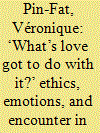

|
|
|
|
|
| Summary/Abstract |
By paying attention to love, this article offers a grammatical reading of International Relations’ founding grammar of inside/outside as an ethics of encounter. The decision to focus on love is, I suggest, to contend with the possibility that IR may express a lethal politics and ethics. I seek to substantiate this claim through an unsettling reading of neo-Jamesian contributions to the emotional turn. I conclude that the discipline’s founding grammar is an ‘avoidance of love’ and offer a reminder that an alternative way of loving is possible.
|
|
|
|
|
|
|
|
|
|
|
|
|
|
|
|
| 2 |
ID:
158941
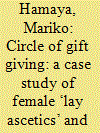

|
|
|
|
|
| Summary/Abstract |
This article investigates everyday practices of begging among female ‘lay ascetics’ in Haridwar, North India. The subject of female asceticism or renunciation in Hinduism has been far less examined than that of male renunciation. Recent feminist-conscious studies have pointed out that female ascetics are generally marginalized within, or completely excluded from, male-dominated ascetic communities, albeit some charismatic female gurus do manage to establish a measure of authority. But gender-based inequality is not the only form of inequality that matters here. This article explores the lives of female ‘lay ascetics’ who are regarded as neither authentic renouncers nor ordinary householders. While male ascetics are prioritized in receiving alms, most female ascetics must struggle to obtain alms through making use of their social networks. Female ascetics cooperate with each other in this for both their mutual advantage and for spiritual reasons. Yet serious competition over alms can and does arise, which can generate moral dilemmas and severe conflict. Through ethnographic descriptions of their gift exchanges, this article will clarify how female ascetics form social networks which are neither completely obligatory nor completely free.
|
|
|
|
|
|
|
|
|
|
|
|
|
|
|
|
| 3 |
ID:
106074
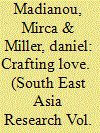

|
|
|
| 4 |
ID:
146076
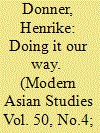

|
|
|
|
|
| Summary/Abstract |
With the exception of a few anthropologists working on gender, much of the recent literature on emerging intimate modernities in South Asia, and the middle class in India in particular, seems to support a view of social relationships evolving in a kind of linear development towards free choice, individualism, and identities based on sexual preference. This imagery is particularly prominent in the representation and self-representation of metropolitan, educated middle-class youths, whose views dominate popular media representations and are associated with secularism, individualism, and independence from family and community. In this article I argue that apart from the ostensibly overwhelming transformations that discourses on coupledom, love, choice and self-realization bring in their wake, new ways of choosing a spouse and of conducting conjugal relations among middle-class urbanites have to be interpreted in relation to much more subtle and long-standing social transformations as well as existing institutional forms, in particular the practical implications of patrilocality and the ideology and reality of the joint family. Based on fieldwork with Bengali-speaking middle-class families in Kolkata spanning two decades, the article charts continuities and subtle shifts in the way ‘love’ and ‘marriage’ are related in conversations, and how young women and their parents negotiate marriage in the context of middle-class consumerism, status competition, and uncertainty.
|
|
|
|
|
|
|
|
|
|
|
|
|
|
|
|
| 5 |
ID:
092956
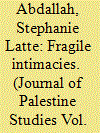

|
|
|
|
|
| Publication |
2009.
|
| Summary/Abstract |
This article focuses on conjugal love as an articulated, lived emotion; on relationships between spouses within the context of the family; and on how these emotions and relations have changed over time in Palestinian refugee camps in Jordan. Based on interviews with four generations of Palestinian camp women, the article charts evolving marital patterns and attitudes toward marriage in relation to changing political circumstances and diverse influences. Particular emphasis is given to the third generation and the emergence of individualization of choice and its consequences. The influence of the family and the role of protection in the formation of conjugal bonds are also addressed.
|
|
|
|
|
|
|
|
|
|
|
|
|
|
|
|
| 6 |
ID:
100759
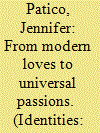

|
|
|
| 7 |
ID:
184579
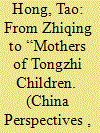

|
|
|
|
|
| Summary/Abstract |
This paper mobilises interactionist sociology to explore the biographies and moral careers of two former zhiqing who emerged, circa 2007, as well-known mother figures in a dynamic tongzhi blogosphere. Their encounter with young tongzhi inaugurated parental advocacy for their sexually nonconforming children in China. By anchoring tongzhi activism in contemporary Chinese history and reconstructing two parallel processes of activist-becoming, this paper seeks to better understand how political agency emerged in an authoritarian setting while making a case for studying activism as historicised meaning-making activities.
|
|
|
|
|
|
|
|
|
|
|
|
|
|
|
|
| 8 |
ID:
145458
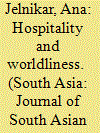

|
|
|
|
|
| Summary/Abstract |
This paper offers a new reading of Rabindranath Tagore's acclaimed novel Ghare Baire (Home and the World) by looking at it explicitly through the prism of hospitality. Drawing on the critical vocabulary of Jacques Derrida, it frames the central question of the novel as that of taking the risk of offering (un)conditional hospitality, with all its consequences. This involves exploring and tracing the ideological roots of the radical ethical position of the main protagonist, Nikhilesh, who self-consciously allows a guest to overstay his welcome. The novel is read as a paean to hospitality as risk-taking, and therefore to the frightening ordeal of freedom with ambiguous outcomes.
|
|
|
|
|
|
|
|
|
|
|
|
|
|
|
|
| 9 |
ID:
184793
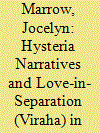

|
|
|
|
|
| Summary/Abstract |
This article examines first-person narratives of a hysteria-like illness, referred to locally as ‘clenched teeth (daant lag gaya)’. In Varanasi, India, the distinguishing sign of ‘clenched teeth’ is a tightly closed mouth, and symptoms involve seizure-like or fainting behaviours. I show how North Indian women improvised upon expressive genres of love-in-separation (viraha) to narrate their experiences of this illness. Drawing upon the symbolic structure of viraha to explain bodily signs and symptoms, patients of ‘clenched teeth’ asserted they were women who loved so deeply and steadfastly that they could not help but experience distress when separated from the person they adore. Simultaneously, these ad-hoc narratives concealed a traumatic kernel—an unbridgeable asymmetry between the sufferer and her beloved—that rendered the emotion conveyed not only that of love, but also of anger and resentment.
|
|
|
|
|
|
|
|
|
|
|
|
|
|
|
|
| 10 |
ID:
092944
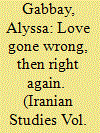

|
|
|
|
|
| Publication |
2009.
|
| Summary/Abstract |
This article examines male/female dynamics in three versions of the classical story of the Sassanian prince Bahr m G r and his lyre-playing slave girl: that of the Sh hn ma of Firdaws?, the Haft Paykar of Niz m? Ganjav?, and the Hasht Bihisht of Am?r Khusraw. It argues that each version provides progressively more positive depictions of intergender dynamics, ones that are contingent upon more egalitarian understandings of the male/female dichotomy. The later authors destabilize the categories of "male" and "female," equalizing and even uniting the dichotomous pairs, so that men and women draw nearer to each other in qualities rather than remaining in their usual polarized positions. In the Hasht Bihisht, moreover, we witness a reversal of hierarchies in which traditionally feminine qualities receive preference over masculine virtues-an act that suggests fresh possibilities for harmonious interactions between the sexes.
|
|
|
|
|
|
|
|
|
|
|
|
|
|
|
|
| 11 |
ID:
098104
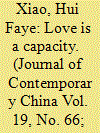

|
|
|
|
|
| Publication |
2010.
|
| Summary/Abstract |
Employing analytical tools mainly from cultural studies and feminist theories, this article examines the televisual representation of changing family values, intimate relationships and gender dynamics parallel to China's neoliberal turn. Specifically, I will offer a close reading of Chinese-Style Divorce, a mega-hit television drama, in a larger context of sociopolitical conditions and cultural trends, particularly a neoliberal market economy and the ongoing state-sponsored 'harmonious society' campaign. I intend to explore how cultural representations of divorce play a key role in projecting and channeling the desire and fantasy of a middle-class domestic culture and in articulating a discourse of domestic and psychic interiority. Tackling rampant gender-related social problems in contemporary China, this article also seeks to address the predicaments with which middle-aged post-reproductive divorced women are confronted in a transitional time.
|
|
|
|
|
|
|
|
|
|
|
|
|
|
|
|
| 12 |
ID:
146075


|
|
|
|
|
| Summary/Abstract |
Theorists of globalization as well as activists' writing from a range of positions have argued that intimate practices are taking centre stage and becoming part of global discourses in the process. This holds true for the institution of marriage and the associated ideas about appropriate family forms, but also more generally for the ways in which ideas about ‘modern selves’ are realized in relationships based on reflexivity and self-knowledge through engagement with an intimate other.
|
|
|
|
|
|
|
|
|
|
|
|
|
|
|
|
| 13 |
ID:
181899
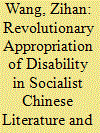

|
|
|
|
|
| Summary/Abstract |
Literature and film in socialist China represented disabled people primarily in two ways: either as courageously contributing to socialist development in spite of physical impairments, or as recovering miraculously due to the medical practices supported by the Chinese Communist Party (CCP). This article seeks to provide a more nuanced understanding of these two narrative paradigms. In the first case, it examines a mutually constitutive structure of love and disability, and then demonstrates how writers maintained a certain agency under socialist censorship by deviating from this structure. In addition, this article traces the formation of miraculous recovery stories and argues that this process was a complex interaction among disability, Soviet or Chinese medical practices, Sino-Soviet relations, and the Mao cult. I will further explore why the second paradigm became more influential than the first one during the Cultural Revolution.
|
|
|
|
|
|
|
|
|
|
|
|
|
|
|
|
| 14 |
ID:
158263
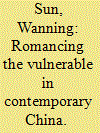

|
|
|
|
|
| Summary/Abstract |
Several decades of economic reform have transformed China into one of the world’s most unequal countries. However, because this inequality has been studied primarily at the structural level, we know little about how it impacts on intimate relationships and affects individuals’ experiences of love and romance. This article engages with this question through a case study of ‘Love on the Assembly Line’, a series of ‘wedding photos’ featuring Chinese rural migrant workers, and the subsequent series of television reports of the same name, dating from 2012–13. It first examines the political-economic context of this minor cultural phenomenon, then examines current contestations over the meaning of love and romance, and finally documents the responses of rural migrant individuals themselves to the project. Combining ethnographic observation, in-depth interviews, and critical discourse analysis, this discussion goes some way towards demonstrating how inequality of emotion can be fruitfully studied, thereby advancing a new and alternative approach to researching inequality in China – one that views love/romance as a cluster of contested cultural narratives and discourses; as a social practice that involves a particular form of distributive injustice; as an integral part of class politics; and as the product of the interaction of these three realms.
|
|
|
|
|
|
|
|
|
|
|
|
|
|
|
|
| 15 |
ID:
087178
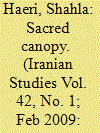

|
|
|
|
|
| Publication |
2009.
|
| Summary/Abstract |
In this article I describe what I see as the subliminal messages of desire and intimacy in the following Iranian movies: Gabbeh (1995), The Blue Scarf (1994), May Lady (1997), and Born in the Month of Mihr (2000). I argue that although the Islamic legal discourse has reasserted itself after the revolution of 1979 and appears to have become dominant, the "erotic" discourse that is ever so subtly embedded in Persian poetry and popular culture is alive and possibly thriving. Taking a light-hearted approach, I discuss representations of love and sex in these four films within the context of the dynamic tension between the legal discourse that regulates the gaze, ahkam-i nigah, and the erotic discourse that subverts the very same regulations, nazar-bazi
|
|
|
|
|
|
|
|
|
|
|
|
|
|
|
|
| 16 |
ID:
178775
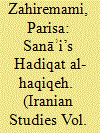

|
|
|
|
|
| Summary/Abstract |
This paper explores the unity of the Hadiqat al-haqiqeh, a medieval mystical didactic work composed by the twelfth-century Persian poet Sanāʾi. It provides one possible reading from the text by following the link between some of the major themes discussed in its chapters. By doing so, the paper first challenges the common view of the work as a fragmentary, non-narrative text, and second it draws attention to the synthesis of political ethics and Sufi didacticism as a possible starting point in the interpretation of the work. It also highlights the possibility—and necessity—of further scholarly inquiry into the Hadiqeh, regardless of issues caused by its complex textual history.
|
|
|
|
|
|
|
|
|
|
|
|
|
|
|
|
| 17 |
ID:
177717
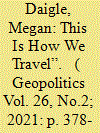

|
|
|
|
|
| Summary/Abstract |
“Movements back and forth […] between cities, between continents, and across oceans and rivers have made travellers of us all,” posits Ruth Behar, “even Cubans who only dream of going places.” In Cuba since the dawn of the twenty-first century, socio-economic change is rapid, continuous, and uncertain, but one constant is the near-absolute spectre of the border. The idea of intimate liaisons with foreigners as a kind of “travel” serves as a jumping-off point in this article, where the stories of locals and foreigners who pursue romance, love, and sex across borders of all kinds serve to make visible the connections between the intimate and the international. The Cuban setting makes everyday emotional, affective, and sexual practices – and the body itself – a particularly fertile ground for resistance, as well as a lightning rod for disciplinary action, with the potential to enact or disrupt structures of the border through the mechanisms of sex and body – and of pleasure. Through an exploration of pleasure as powerful and political, the intimate – often sidelined as a “feminine” and apolitical sphere – can be revealed as a productive and radically relational mode, a vector of international and transnational relations, and a fertile ground for resistance. As bordering practices assert themselves in multiple and evolving ways both externally (travel restrictions) and internally (social and economic divisions between Cubans and foreigners), this article explores how bodies become a means of circumventing and reinscribing those same geopolitical, ideological, and sexual borders policed by states.
|
|
|
|
|
|
|
|
|
|
|
|
|
|
|
|
| 18 |
ID:
139621
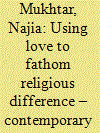

|
|
|
|
|
| Summary/Abstract |
Since September 11, Pakistan has been at the precarious ‘front-line’ of the ‘Global War on Terror’. Inside Pakistan, religious difference has increasingly been connected, at least ostensibly, with attacks on religiously defined targets. Furthermore, actors with links to Pakistan have been implicated in terrorist incidents abroad, notably the recent discovery of Osama Bin Laden's hideout in Pakistan. This context of heightened religious conflict has prompted a dual-purpose ideational response by certain Pakistani elites, on the one hand, to religious violence at home and, on the other, to external narratives depicting Muslims and Pakistanis as ‘religious extremists’. This paper traces the ideas of the contemporary music initiative, Coke Studio Pakistan that renders Sufi poetry to fusion formats in order to refashion a Muslim identity for its producers. Specifically, I examine the Sufi concept of love, offered by this group to undergird a ‘good’ Muslim's attitude towards religious difference in a discursive setting increasingly complicated by perceptions of Western ‘Islamophobia’ intermingled with fears about rising religious extremism at home.
|
|
|
|
|
|
|
|
|
|
|
|
|
|
|
|
|
|
|
|
|